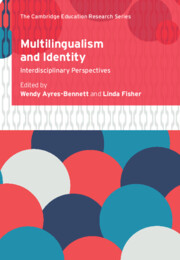Book contents
- Multilingualism and Identity
- Multilingualism and Identity
- Copyright page
- Contents
- Figures
- Tables
- Contributors
- 1 Towards Interdisciplinarity in Multilingual Identity Research
- Part I Situated Multilingualism and Identity
- Part II Multilingual Identity Practices
- Part III Multilingual Identity and Investment
- 13 Multilingualism(s), Globalization and Identity
- 14 Who Are the Multilinguals?
- 15 Multilingual Identity Construction through Participative Reflective Practice in the Languages Classroom
- 16 Young Children’s Language Attitudes with Implications for Identity in a US Dual-Language Immersion Classroom
- 17 Language, Identity and Empowerment in Endangered Language Contexts
- 18 Afterword
- References
- Index
16 - Young Children’s Language Attitudes with Implications for Identity in a US Dual-Language Immersion Classroom
from Part III - Multilingual Identity and Investment
Published online by Cambridge University Press: 22 July 2022
- Multilingualism and Identity
- Multilingualism and Identity
- Copyright page
- Contents
- Figures
- Tables
- Contributors
- 1 Towards Interdisciplinarity in Multilingual Identity Research
- Part I Situated Multilingualism and Identity
- Part II Multilingual Identity Practices
- Part III Multilingual Identity and Investment
- 13 Multilingualism(s), Globalization and Identity
- 14 Who Are the Multilinguals?
- 15 Multilingual Identity Construction through Participative Reflective Practice in the Languages Classroom
- 16 Young Children’s Language Attitudes with Implications for Identity in a US Dual-Language Immersion Classroom
- 17 Language, Identity and Empowerment in Endangered Language Contexts
- 18 Afterword
- References
- Index
Summary
This chapter focuses on young students’ attitudes towards the partner languages in dual-language immersion (DLI) programmes, as well as attitudes towards the speakers of these languages with implications for students’ identities as bilingual/biliterate learners in this educational context. The chapter uses example findings with primary school students (5–8 year olds) acquiring Spanish and English in a US DLI programme who are part of a multi-year research and evaluation project. Students are compared with student peers in their school’s English-medium classrooms to help understand potential differences in language attitudes stemming from their instructional experiences. This work is part of a growing call to consider the ‘whole child’ in developmental contexts and a need to employ multidisciplinary and longitudinal methods to better understand the impact of bilingual educational settings on children’s growth and well-being, moving beyond a narrow focus on academic achievement and language proficiency outcomes.
Keywords
- Type
- Chapter
- Information
- Multilingualism and IdentityInterdisciplinary Perspectives, pp. 321 - 340Publisher: Cambridge University PressPrint publication year: 2022
- 1
- Cited by

